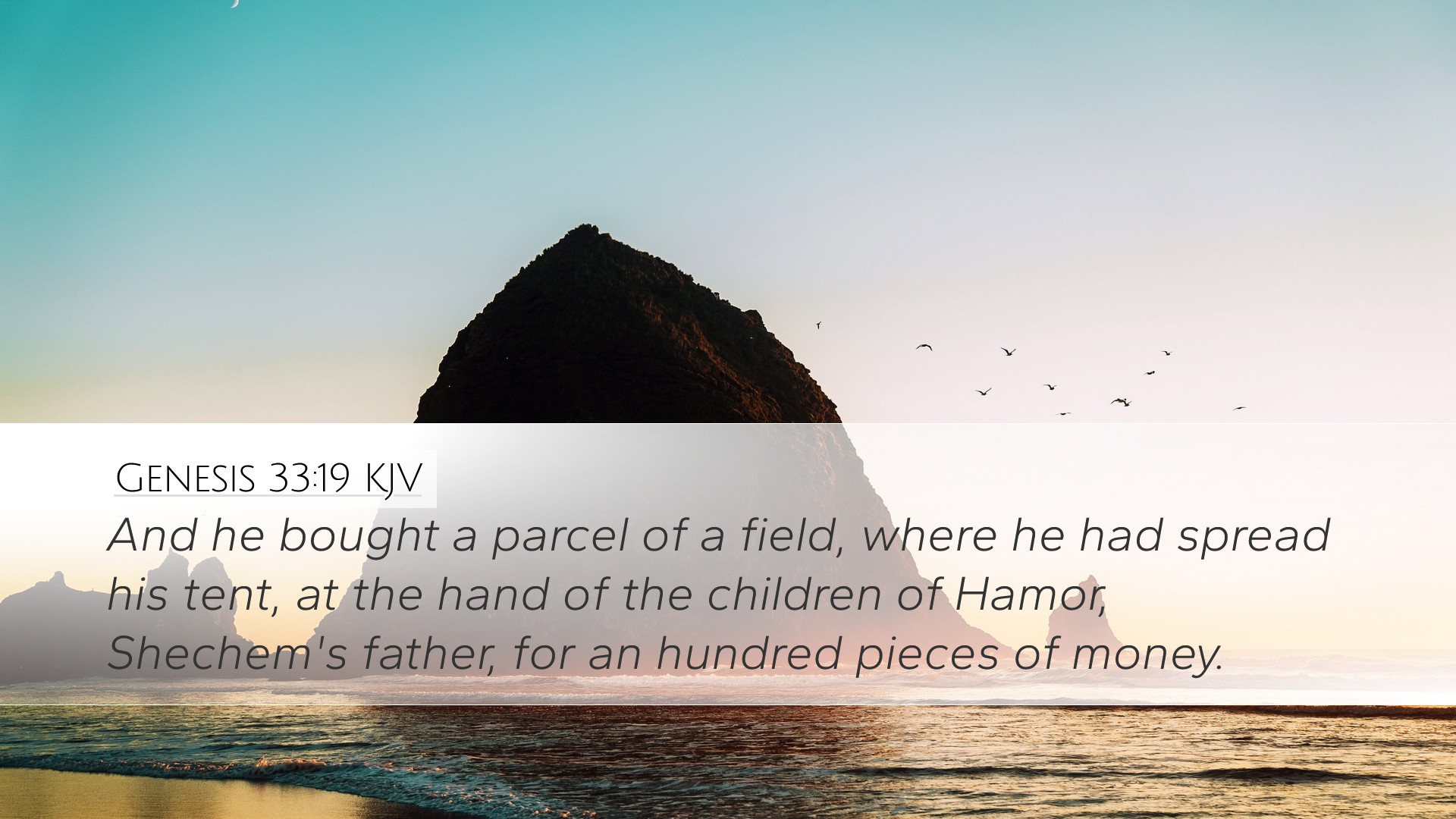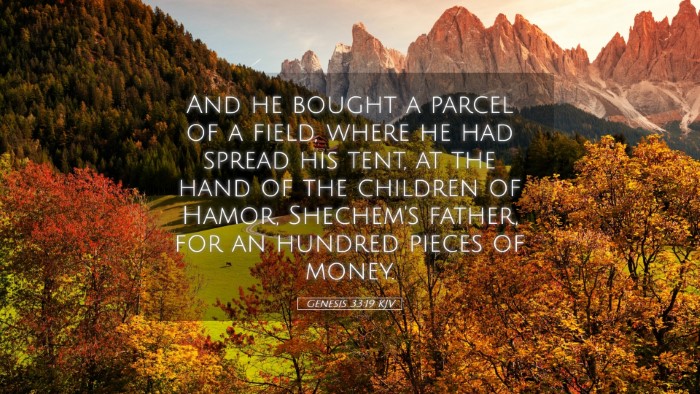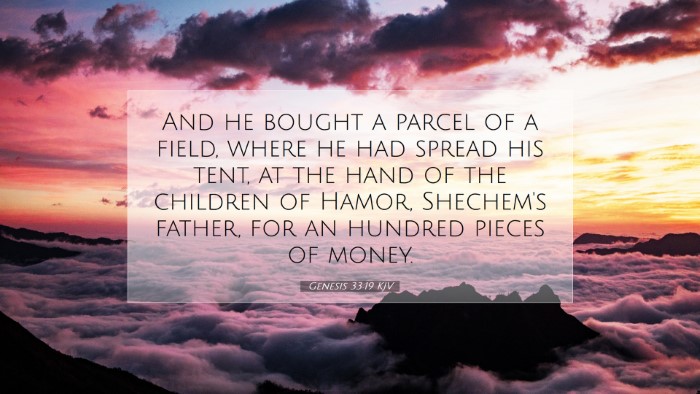Commentary on Genesis 33:19
Verse: "And he bought a parcel of a field, where he had spread his tent, at the hand of the children of Hamor, Shechem's father, for a hundred pieces of money."
Introduction
The narrative of Jacob’s return to Canaan culminates in Genesis 33:19, which highlights a pivotal moment in Jacob's life—his settlement in Shechem. This verse encapsulates themes of restoration, faith, and the establishment of a lasting inheritance. The purchase symbolizes not only Jacob's commitment to the land promised to him and his ancestors but also sets a historical and theological backdrop for the events that will unfold in the subsequent chapters of Genesis.
Contextual Overview
To understand Genesis 33:19 in its full context, it is essential to explore the preceding events of Jacob's journey. After years of exile, Jacob's return signifies both a physical and spiritual homecoming. The reconciliation with his brother Esau illustrates the theme of forgiveness and reconciliation, which precedes the foundation of his new settlement. In Genesis 33:18-20, Jacob's actions are recorded in various stages that reveal his intentions and motivations.
Commentary Insights
Matthew Henry's Commentary
Matthew Henry emphasizes that this verse marks a significant transition for Jacob. Purchasing the field symbolizes Jacob’s faith in God’s promises and his intent to claim his rightful inheritance. Henry notes that the act of buying land is not merely a practical purchase; it represents Jacob’s acknowledgment of Shechem as an integral part of the land that God had sworn to give to Abraham, Isaac, and their descendants. This act also reflects communal relations, as he engages with the local population, specifically the children of Hamor, indicating an initial step towards establishing his family’s roots in the land.
Albert Barnes' Commentary
Albert Barnes provides additional insights regarding the transaction itself. He points out that the price Jacob paid—one hundred pieces of money—could signify the value he placed on the land, indicative of his commitment not just to the physical property but to the land's spiritual implications. Furthermore, Barnes highlights that this event foreshadows the future Biblical significance of Shechem, noting that it later becomes a central site for Israel’s history, including the blessings and curses pronounced on Mount Gerizim and Mount Ebal. This prospective importance underscores the foresight and faith with which Jacob operates.
Adam Clarke's Commentary
Adam Clarke draws attention to the specifics of the transaction and its implications. He elaborates on the significance of Jacob’s choice of Shechem as a place to settle, emphasizing that it was a region of strategic importance and rich historical legacy. Clarke also explores how this purchase sets the stage for the future tribes of Israel, presenting Jacob not only as a patriarch of his family but also as a key figure in the unfolding story of Israel’s development as a nation. His settlement in Shechem is thus imbued with prophetic significance regarding how God will work through his descendants.
Theological Reflections
- Covenant Significance: Jacob's purchase serves as a tangible affirmation of God's covenant with him. It illustrates a step taken in faith, solidifying his inheritance in the land promised by God.
- Legacy of Faith: The acquiring of land reflects a commitment to future generations, demonstrating Jacob’s role not only as a patriarch but as a man who looks forward to the establishment of God’s promises through his offspring.
- Community Relations: Engaging with the local inhabitants signifies an important aspect of living out one’s faith in community, suggesting that true faith is practical and relational.
- Foreshadowing: Shechem’s prominence in later biblical narratives highlights how Jacob’s purchase was not merely for personal gain, but part of a divine plan that would unfold through Israel’s history.
Practical Applications
- Faith in Action: Just as Jacob took tangible steps in faith by purchasing the land, believers today are called to act upon God’s promises, trusting that He will fulfill them.
- Relationships Matter: Jacob's interaction with Hamor’s family serves to remind us of the importance of fostering good relationships within our communities, reflecting the love Christ shows us.
- Planning for the Future: The commitment Jacob made to his family’s future through this purchase is a lesson for contemporary believers to invest in the spiritual and physical well-being of future generations.
- Understanding Our Heritage: Reflecting on our own spiritual inheritance urges us to appreciate the foundations laid by those who came before us and to ensure we contribute positively for future generations.
Conclusion
Genesis 33:19 encapsulates a significant turning point in Jacob’s life and in the overarching narrative of Scripture. With the purchase of land, we witness Jacob’s obedience to God’s promise and his establishment of a legacy built on faith. The insights from the public domain commentaries provide rich theological reflections and practical applications that encourage believers to live out their faith, invest in their communities, and consider the lasting impact of their actions. In this simple yet profound act, Jacob becomes a paradigmatic figure for all who seek to follow God’s call amid their life journeys.


